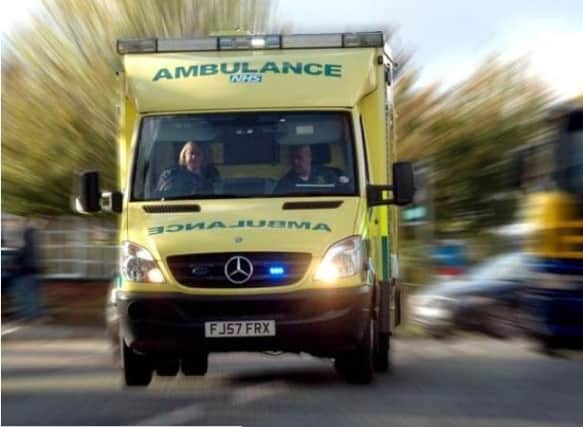‘Rapid action’ promised after damning report into leadership of ambulance service that serves the Banbury area


Bosses in charge of the ambulance service that serves the Banbury area have vowed to make 'rapid improvements' after a damning report on their leadership.
The Care Quality Commission (CQC) has rated South Central Ambulance Service NHS Foundation Trust 'inadequate', following an inspection undertaken in April and May.
Advertisement
Hide AdAdvertisement
Hide AdThe inspection was prompted by concerns CQC received about the quality of the trust’s governance and its staff training.
The Trust's chief executive Will Hancock said: “The CQC has highlighted some serious concerns which we must, and will, fix as a matter of urgency. I want to reassure everyone that we have already taken swift action, but I recognise we have more to do."
CQC assessed the Trust’s leadership, its emergency operations centre (EOC), and the urgent and emergency care it provides to people.
Inspectors found issues with the Trust’s governance which they said 'undermined the quality of care it provided to people'.
Advertisement
Hide AdAdvertisement
Hide AdFollowing this inspection, CQC’s overall rating for the Trust and its ratings for how safe and well-led it is have dropped from good to inadequate. CQC rating for how responsive to people’s needs the trust is, has deteriorated from good to requires improvement, while its ratings for being effective and caring remained good.
For the core services within the Trust that CQC inspected, the rating for the EOC has dropped from good to requires improvement, and the rating for emergency and urgent care has deteriorated from good to inadequate.
Denna Westwood, director of CQC’s South Network, said: “We initially carried out this inspection of South Central Ambulance Service NHS Foundation Trust in response to concerns about the quality of the trust’s governance and training.
“However, as the inspection progressed, we identified further issues - particularly around shared learning from serious incidents and allegations against staff not being appropriately addressed. We also found safeguarding wasn’t being given the priority it deserved, which is something we had already identified to the trust in November 2021.
Advertisement
Hide AdAdvertisement
Hide Ad“As a result of our concerns, we have issued the trust with a warning notice so it’s clear about the areas it immediately needs to address to ensure people’s safety.
“Despite the issues which undermined the quality and safety of care the trust provided, staff on the front line were doing their absolute best to provide safe and effective care and treatment of patients - despite, in some cases, feeling overwhelmed and having a sense of ‘compassion fatigue’. They should be applauded for the job they are doing, especially in light of the additional pressures on the service caused by the COVID-19 pandemic.
“But while staff were doing their very best to provide safe care to patients and support to each other, leaders sometimes appeared out of touch and were not fully sighted on issues that impacted the overall effectiveness of the care they were providing.
“We also found there were frequent and prolonged delays in reaching people who had requested emergency assistance, and this resulted in poor outcomes for some people. Some of these issues are as a result of long waiting times outside of hospital to admit their patients, but there is action the trust can take to mitigate the impact of this on people. We would also encourage system leaders to work with the trust, as they cannot solve all of these problems alone.
Advertisement
Hide AdAdvertisement
Hide Ad“Staff described a dismissive attitude from trust leaders when they raised concerns and also told us people who raised concerns were treated badly as a result, and it was evident that the trust did not adhere to its own policy for whistle-blowers.
“I want to thank the staff who spoke up and praise them for being brave enough to come forward. Speaking up in these circumstances is not easy, but it is important that it happens because it can support safer and more effective patient care and treatment."
Mr Hancock from SCAS added: "We have an extensive improvement plan and we are committed to making things better. We will keep focused on putting things right until we and the CQC are confident all the concerns have been fixed.
“It is vital that every member of our team can raise concerns with the confidence they will be dealt with quickly and effectively. We are also working with our partners across the NHS to manage the on-going pressures so we can improve response times and hospital handover times.”
Advertisement
Hide AdAdvertisement
Hide AdProfessor Sir Keith Willett, Trust chair, said: “This rating is a huge disappointment to everyone. The board takes responsibility for that and we will work with colleagues across the Trust and our partners to put things right. In doing so I’m confident SCAS will become a better Trust that it has ever been, both for our patients, staff and volunteers.”
Click here for the full report: https://www.cqc.org.uk/provider/RYE
Overall, the inspectors found:
Safeguarding was not given enough priority. Inspectors received information from a whistle-blower raising concerns about negative experiences at the trust. There were concerns regarding ambulances having to wait outside of emergency departments with a patient onboard for several hours before the hospitals had capacity to accept them into the department. The trust’s board’s extreme positivity about its performance and the organisation’s culture could feel dismissive of the reality to frontline staff.
However, inspectors also found:
In emergency and urgent care, patients were treated with kindness and compassion. Staff had been particularly kind and gone the extra mile to meet the needs of patients and their families. There were numerous examples of innovative practice that supported people getting the right care, in the right place.